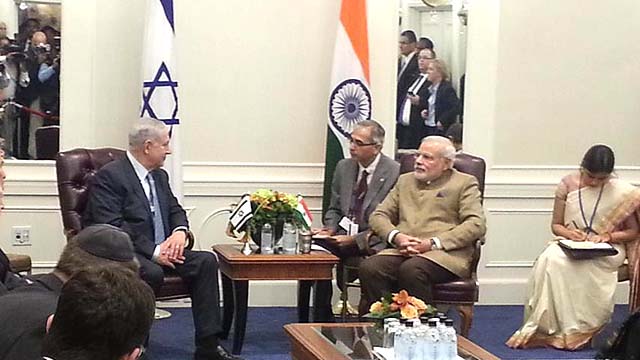Modi-Netanyahu Meet: Dramatic Shift
Narendra Modi meets Israeli Prime Minister Benjamin Netanyahu

NEW DELHI: The meeting between Prime Minister Narendra Modi and Israeli Prime Minister Benjamin Netanyahu on the sidelines of the UN General Assembly at New York is the first sign of what might indeed be a dramatic turnaround in India’s relations with Israel. The strong signals sent out through this meeting will be formalised as and when PM Modi accepts Netanyahu’s invitation to visit Israel “at an early date.”
It was projected as a meeting of minds by both sides with a justifiably excited Netanyahu---given the international flak he faced after the attack on Gaza---insisting that for India-Israel relations now the “sky is the limit.” During the discussion the attack on the Palestinians in Gaza was not raised, although Netanyahu dwelt at some length on his concerns about “militant Islam.”
The discussions have been highlighted in the Israeli media with all the major newspapers carrying detailed reports of what is the first meeting between heads of governments of both countries in a decade. It also confers legitimacy on Israel’s barbaric attack on the Palestinians in Gaza that has drawn flak from across the world, even countries that were supporting Tel Aviv at the first instance, as India was amongst those seen to have been supportive of the Palestinians struggle for their homeland.
The meeting, thus, signalled a decisive and categorical shift in Indian policy that will be formalised when PM Modi visits Israel on an invitation now extended to him by Netanyahu. Interestingly, in a long report on the meeting Israel’s Haaretz newspaper noted, “Modi, who took office in May after a major electoral upheaval, is considered a bit exceptional in the Indian political landscape since he holds pro-Israeli views which he does not hesitate to express publicly. He even visited Israel in 2006. For his part, Netanyahu called to congratulate Modi 24 hours after his recent victory in the polls.
The populist Modi is controversial because of his nationalistic Hindu positions and his anti-Muslim stance, and when he served in the opposition, the United States government refused to grant him a visa because of those views.
Netanyahu sees Modi as a leader who is likely to have an impact on the nature of relations between their countries.”
The meeting allowed Netanyahu to raise the issue of a nuclear armed Iran, and the “global threat posed by Islamic terrorism.” This echoed his speech at the United Nations where he focused on “militant Islam”, Hamas, the Islamic State and on Iran in the discussions with the Indian Prime Minister. At the UN, Netanyahu said, “Last week, many of the countries represented here rightly applauded President Obama for leading the effort to confront ISIS. And yet weeks before, some of these same countries, the same countries that now support confronting ISIS, opposed Israel for confronting Hamas. They evidently don’t understand that ISIS and Hamas are branches of the same poisonous tree.So when it comes to their ultimate goals, Hamas is ISIS and ISIS is Hamas.”
Netanyahu, according to the Israeli media, updated PM Modi about the decision to establish a national cyber-defense authority and proposed bilateral cooperation in this area. Expanding the already burgeoning defence ties was also discussed by the two PM’s. As was cooperation in agriculture, water management, computer software with Netanyahu quoted as saying at the meeting, “This is an opportunity for Israel and India to expand our relationship even further. We are two old peoples, some of the oldest in the nations on earth, but we are also two democracies. We’re proud of our rich traditions but we’re also eager to seize the future. I believe that if we work together we can do so with benefits to both our peoples.
"So in that spirit it’s a wonderful opportunity to see you here and I would like to invite you to come to Israel. I know you’ve been there before, it will be a pleasure to welcome you again. We’re very excited by the prospects of greater and greater ties with India, we think the sky is the limit.”
PM Modi is credited by the Israeli media with the following response: “I agree with [Prime Minister Netanyahu] that India-Israel relations are historical. I met this morning with the people from the Jewish community, American Jewish Committee, and they all appreciated that there is a deep recognition in Israel that India is the only country where anti-Semitism has never been allowed to come up, where Jews have never suffered and lived as an integral part of our society. There was a time in the city of Mumbai that Hebrew was officially taught in the university and even one of the mayors of Mumbai city was from a Jewish family.”
PM Modi has been to Israel when he was Chief Minister of Gujarat in 2006.
The meeting at New York was kept under wraps till the last moment with it being first on the Israeli PM’s schedule of bilateral meets. On his part PM Modi did not meet with Palestinian Authority leader Mahmoud Abbas. He also did not refer to the Palestinians in his address to the United Nations.



